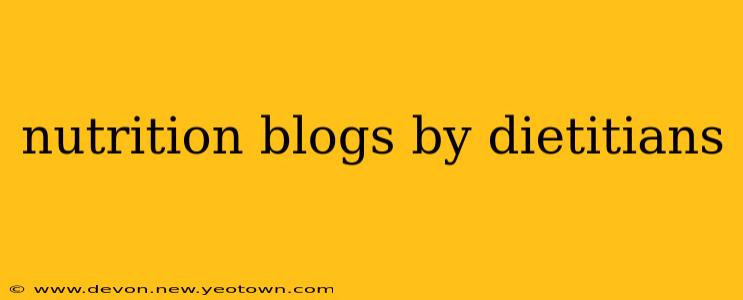Finding reliable nutrition information online can feel like searching for a needle in a haystack. The internet is flooded with fad diets and misleading claims, making it difficult to discern trustworthy advice. But fear not! This guide navigates you through the world of nutrition blogs, highlighting those created and maintained by registered dietitians (RDs) – your trusted source for evidence-based eating guidance. We'll delve into why choosing an RD's blog is crucial, explore some top choices, and answer your frequently asked questions.
Why Choose a Nutrition Blog Written by a Registered Dietitian?
Imagine this: you're trying to lose weight, manage diabetes, or simply eat healthier. You stumble upon a blog promising rapid results with a restrictive diet. Sounds tempting, right? However, without expert guidance, such drastic measures can be harmful. This is where registered dietitians step in. RDs are healthcare professionals with extensive education and experience in nutrition science. Their blogs provide:
- Evidence-based information: RDs base their advice on scientific research, not trendy fads.
- Personalized recommendations: While blogs offer general advice, RDs understand that individual needs vary.
- Safe and effective strategies: They prioritize your health and well-being, ensuring recommendations are safe and sustainable.
- Accountability and support: Many RDs offer coaching or community aspects within their blogs, providing support and accountability.
Choosing a blog written by an RD is an investment in your health and well-being – a decision that prioritizes safety and effective, long-term results.
Finding the Right Nutrition Blog for You: Top Picks (Note: This is not an exhaustive list, and blog quality can change over time. Always research the author's credentials.)
Finding the perfect blog depends on your individual needs and preferences. Some RDs focus on specific areas like weight management, sports nutrition, or pediatric nutrition. Explore a few and see which resonates with you.
What are some popular topics covered by registered dietitians' nutrition blogs?
Many RDs cover a wide range of topics to help their audience achieve their health goals. Common themes include:
- Weight management: Strategies for healthy weight loss and maintenance, debunking diet myths.
- Meal planning: Practical tips and recipes for creating nutritious and delicious meals.
- Specific dietary needs: Guidance for individuals with conditions like diabetes, celiac disease, or food allergies.
- Healthy eating habits: Strategies for making sustainable dietary changes.
- Recipe development: Creative and healthy recipes that cater to various dietary needs and preferences.
- Grocery shopping tips: Strategies for making informed choices at the grocery store.
- Cooking methods: Tips on preserving nutrients during food preparation.
- Mindful eating: Techniques to improve your relationship with food.
- Nutrient deficiencies: Understanding and addressing potential nutrient shortfalls.
How can I tell if a nutrition blog is written by a qualified registered dietitian?
It's crucial to verify the author's credentials. Look for:
- RD or RDN credentials: These are the designations for registered dietitians.
- Professional affiliations: Check for affiliations with professional organizations like the Academy of Nutrition and Dietetics.
- About page: The blog should have an "About" section with information about the author's qualifications and experience.
- Disclaimer: A responsible blog will include a disclaimer stating that the information is not intended as medical advice and should not replace professional consultations.
Are there any free resources available from registered dietitians?
Yes! Many RDs offer free resources like blog posts, recipes, and printable guides. Check out their websites for this valuable information. However, remember that personalized advice should always come from a one-on-one consultation with a qualified healthcare professional.
What are the differences between a nutritionist and a registered dietitian?
In many places, the term "nutritionist" is unregulated. Anyone can call themselves a nutritionist without formal training. Registered dietitians (RDs or RDNs), on the other hand, are licensed healthcare professionals who have completed rigorous education and training. This significant difference ensures that RDs are equipped to provide safe and effective nutrition advice.
Conclusion: Your Journey to Healthier Eating Starts Here
Navigating the world of online nutrition information can be challenging, but choosing a blog written by a registered dietitian is a crucial step towards making informed decisions about your health. Remember to always verify the author’s credentials and consult with a qualified professional for personalized advice. By combining the wisdom found on reliable RD-led blogs with your own self-awareness, you can embark on a confident and successful journey towards better health and well-being.

